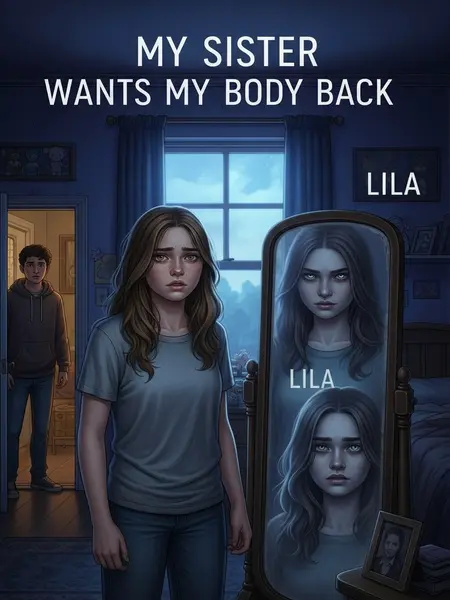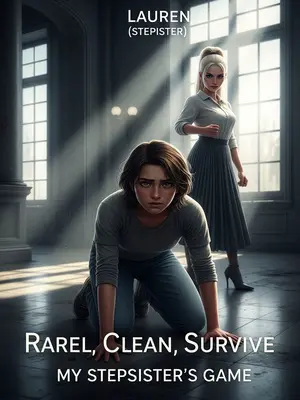Chapter 2: Living With My Sister’s Ghost
I have an older sister, Lila Morgan, three years my senior.
Her name used to fill our house—birthday banners, report cards on the fridge, trophies lined up on the mantel. Even after she was gone, her presence lingered in every corner.
I remember when I was six, Mom and Dad came home late, their faces full of grief.
The night was thick with silence. I remember the way Dad’s hands shook as he fumbled with his keys, and how Mom’s eyes looked swollen and red. I could sense something was wrong before they even spoke.
When she saw me, Mom broke down, hugging me and sobbing, "Lila is gone, Maddie. You don’t have a sister anymore."
Her arms wrapped around me so tight I could barely breathe. Her tears soaked my hair, and I felt her body tremble with every sob. I was too young to understand, but I knew my world had changed.
I didn’t really get it, but seeing Mom cry made me cry too.
The pain in her voice was contagious. I started crying just because she was, the two of us huddled together on the hallway floor, lost in our grief.
Between sobs, I pointed at a pile of dolls nearby and said, "But isn’t my sister right there?"
I remember the confusion on Mom’s face as she followed my finger. My dolls were lined up on the couch, their glassy eyes staring back at us. To me, it made sense—Lila was still here. She had to be.
At first, my parents didn’t believe me. They even scolded me for it.
They thought I was just acting out, refusing to face the truth. Dad would kneel down, his voice stern but pleading, telling me not to talk nonsense. Mom would shake her head, wiping her eyes, insisting I stop making things harder for everyone.
But then I repeated conversations they’d had in their bedroom. At first, they thought I was eavesdropping. But over time, they realized I wasn’t. Finally, they believed me.
I’d tell them things I shouldn’t have known—arguments about bills, whispered worries after midnight. They’d look at each other, uneasy, until finally Mom sat me down and asked, “How do you know these things, Maddie?” That’s when they started to believe.
I wasn’t lying. Lila was always with me—sleeping in her own room, going to school with me. The things my parents said in their room, she told me about them. She knew she was dead. And she told me that, every night.
It became our secret. At night, I’d whisper to Lila in the dark, and she’d whisper back, her voice warm and real. She’d tell me stories, share secrets, and sometimes, she’d cry with me. I never felt alone.
But whenever I told others I could see Lila, they’d look at me like I was crazy.
Teachers would pull Mom aside, their voices hushed and concerned. Other kids would stare, wide-eyed and wary, whispering behind my back. I learned quickly that some things were better kept to myself.
Some people even said, "That family’s cursed—one kid dead, the other nuts."
The words hung in the air, sharp and ugly. Sometimes I’d hear them right before the room went quiet. Sometimes they’d echo in my head long after I got home.
Relatives and classmates called me an attention-seeking liar.
At family gatherings, aunts would purse their lips, and cousins would roll their eyes. At school, kids would nudge each other, smirking as I walked by. I started to dread birthdays and holidays, when everyone would gather and pretend not to notice me.
On the surface, classmates still hung out with me, but I overheard them laughing at me more than once.
I’d catch snippets of conversation—"There goes Maddie, talking to herself again." The laughter would sting, sharp and cold, and I’d pretend not to care, but it always found a way in.
Whenever that happened, Lila would try to fight them, but she was just a ghost—she couldn’t hurt anyone. The most she could do was make them sneeze a couple times.
Sometimes, I’d feel a sudden chill in the air, or see someone shiver for no reason. Lila would giggle, satisfied with her small victories. It made me smile, even when everything else felt wrong.
After that, I stopped telling anyone about Lila—except my parents.
It was easier to keep the secret, to let the world think I was just a quiet, lonely kid. At home, though, Lila was real. She was my secret, my comfort, my shadow.
At home, though, life went on. Sort of.
We found a new normal. Dad would set an extra place at the table sometimes, and Mom would ask what Lila thought about my new haircut. It was strange, but it made me feel seen.
My parents got used to her presence in my stories. They couldn’t see her, but when they bought me things, they’d buy something for Lila too.
Birthday cakes with two sets of candles, matching pajamas under the Christmas tree. They tried to keep her memory alive, and in doing so, they kept me from feeling alone.
Nothing—not even time—could dull their love for the daughter they’d lost.
Even when Lila wasn’t there, her room stayed untouched—bed made, posters still on the wall, trophies gathering dust. It was like she’d just stepped out for a minute, and any day now, she’d come home.
I’d pass along what Lila thought, basically playing messenger.
Sometimes, I felt more like a messenger than a daughter. I’d tell Mom what Lila missed about her, or pass along Dad’s jokes. It was bittersweet, like living two lives at once.













